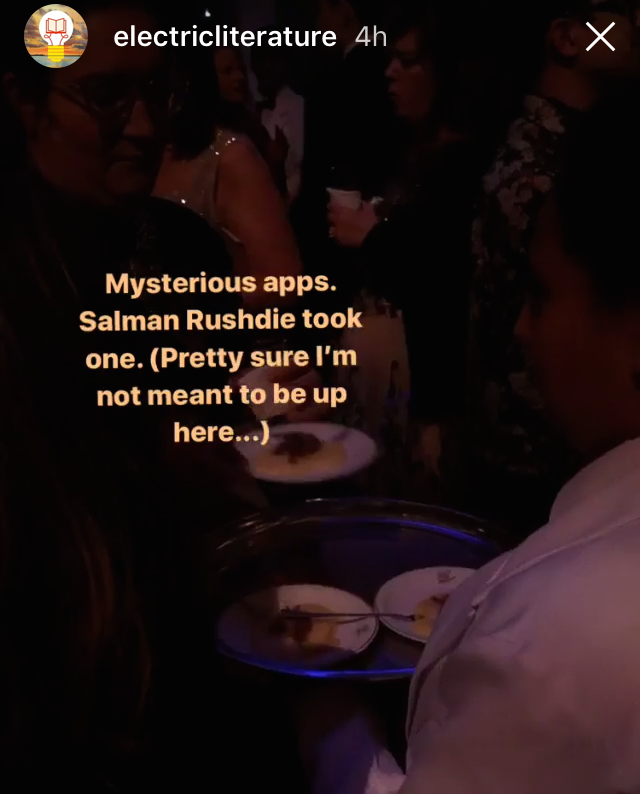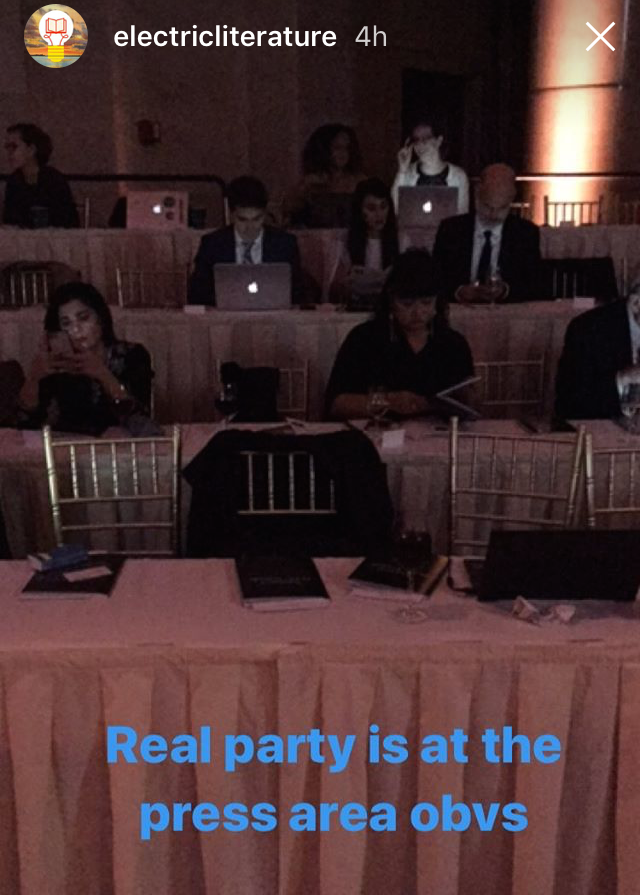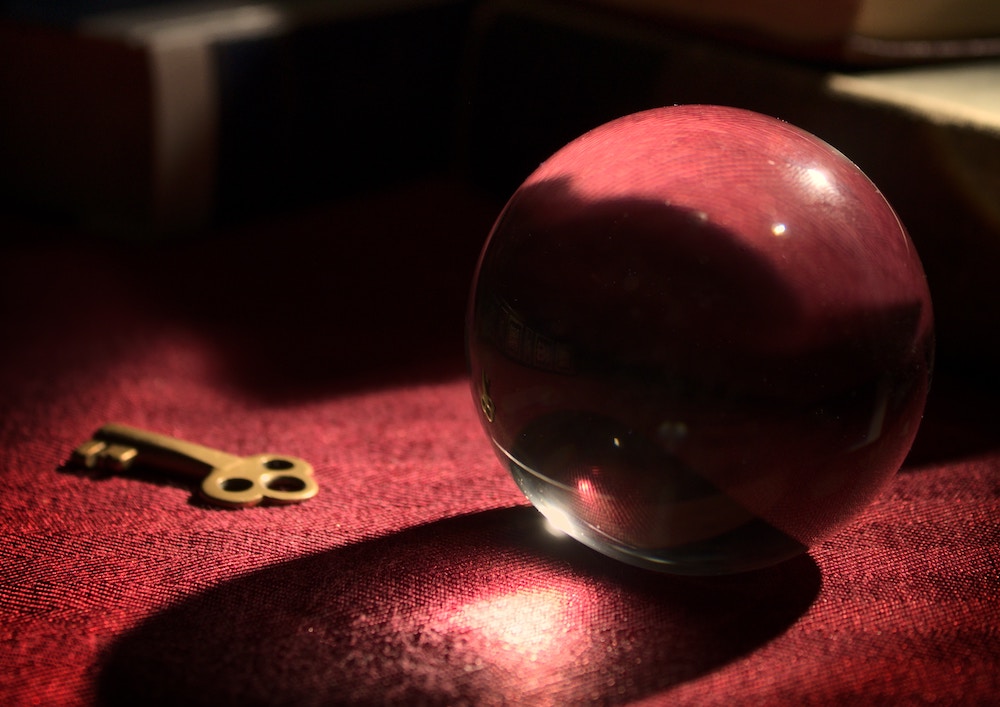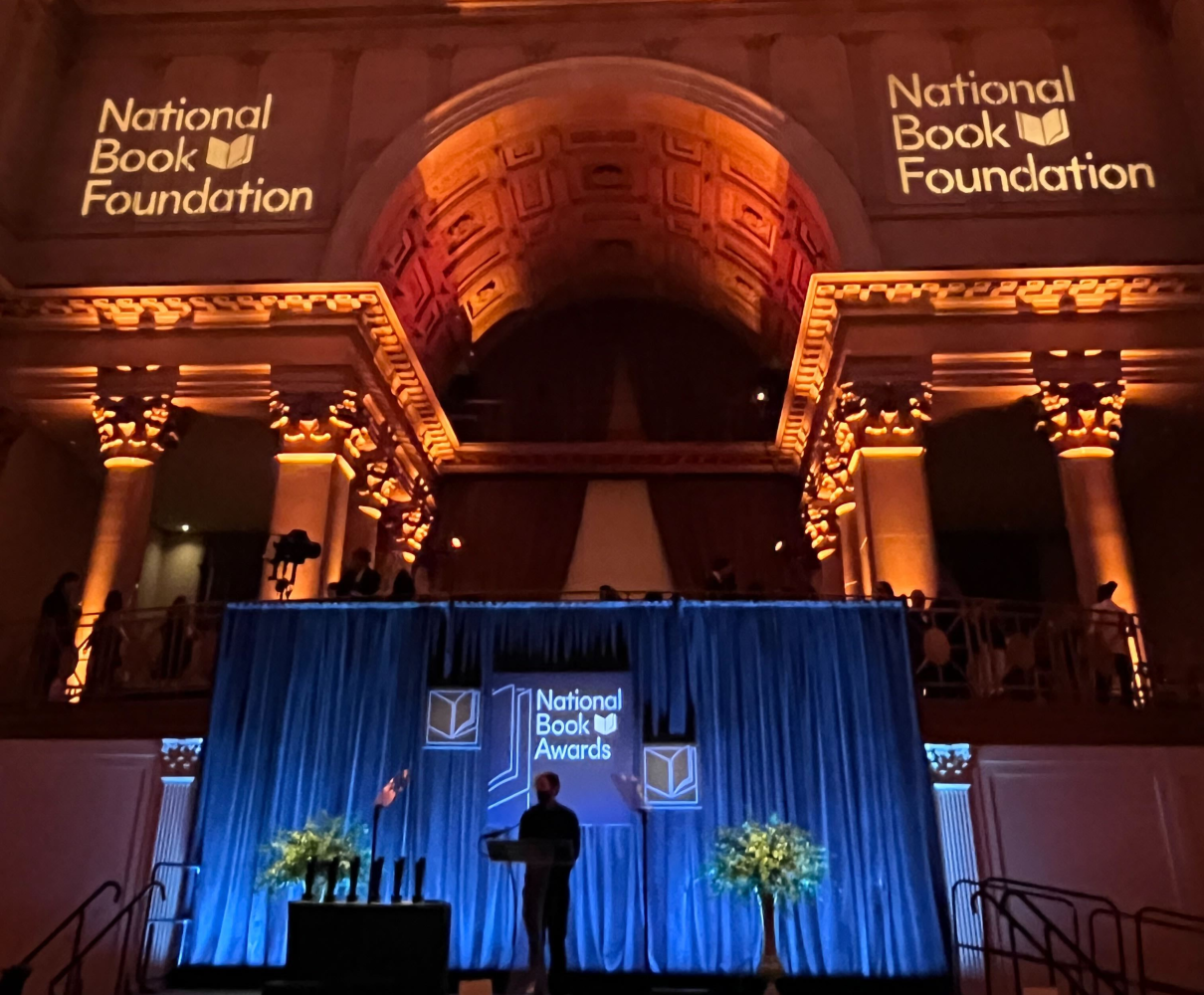news
I Stood in Line for the Bathroom with a National Book Awards Winner
Disappearing tables, awkward introductions, and an open bar at one of America’s biggest literary events

I had never been to the National Book Awards before, but this year, a year when Anne Hathaway and Bill Clinton were presenting and the nominees were diverse in both voice and form (Carmen Maria Machado’s debut short story collection was on the fiction longlist alongside Daniel Alcaron and Jennifer Egan), this wonderful publication sent me in a press capacity. They promised an open bar, but I found a much more interesting spectacle. (And also an open bar.)

I arrived to see guests including past winners Phil Klay and Jacqueline Woodson filing through the tent trying to avoid the red carpet. National Book Foundation Executive Director Lisa Lucas fretted over something “missing at table 4." That something, it emerged, was the table. (They found it.) I, um, accidentally found myself in the upstairs balcony area where fancy people like Salman Rushdie were eating confusing-looking appetizers that might have been flattened flan. The view from up there of 50-something delicate tables, stacked with books and wine glasses, made for an elegant calm before the storm.
The awards commenced with Cynthia Nixon introducing Bill Clinton — or she tried to, but he made for the stage before she could read his bio, to which he remarked in his speech, “First of all, I owe Cynthia an apology, I guess, for barging in but I thought I was being introduced.” Having just read a harrowing article in The Atlantic about his history of sexual harassment, I found that one hard to stomach. (Did this year, of all years, have to be the one where a significant American literary award was presided over by a serial harasser?) But I guess Bubba spoke well, and he introduced and awarded Dick Robinson of Scholastic a Literarian Award, for outstanding service to the literary community. Robinson’s corporation is doing an incredible job of upholding the human ability to communicate in words and letters. Like really, especially now, American children would be illiterate without him.
Did this year, of all years, have to be the one where a significant American literary award was presided over by a serial harasser?
Anne Hathaway was up next, supremely eloquent in her introduction to lifetime achievement award winner Annie Proulx. “I don’t know Annie,” Anne remarked, “My connection to her is rather tenuous given that my character lives in a single paragraph towards the end of Brokeback Mountain…they beefed me up in the movie.” But clearly Anne knew her work; she told us, “Because of her work I am better able to welcome the tenderness of loss if not the loss itself.” The author, of course, was also riveting in her articulation of the role of great fiction anytime and in the Trump era, an era she described as “the opening of a savagely difficult book without a happy ending.” Proulx also brought the first major shock of the night when she told us, “Although this is for a lifetime achievement award I didn’t start writing until I was 58…so if you’ve been thinking about it and putting it off…”
Then we broke for dinner. It looked like the guests were eating a circular steak. I went to the ladies room and while waiting in line, imagined once again what it would be like to be a man, go to the bathroom, and just walk right in.

After a long video and a brief speech about the work of the National Book Foundation, the book awards, the sauce of the evening, began. Robin Benway, author of Far From the Tree, took the Young People’s Literature award. Her speech was full of family: her father would have asked her when she was getting to work on her next book, her book was dedicated to her brother, her mother was the one who taught her to look up every word she didn’t know. Also, she asked her current editor to forgive her for being more than a year late with a new manuscript now that she’d won an award. We second that.
Monica Youn, poet and — did everyone else know this? — lawyer, presented the poetry award. “We keep being asked, What can poetry do?” Monica said. Her answer: be ornery. Frank Bidart won the Poetry Award, and his first shoutout of gratitude was to his editor, Jonathan Galassi. Cheers to editors! “I realized within the past month, that I’m almost twice as old as all of the other finalists,” said Bidart. “Writing the poems was how I survived.” A theme of the evening was emerging — great literature doesn’t happen in a rush or a rushed life.
A theme of the evening was emerging — great literature doesn’t happen in a rush or a rushed life.
Paula J. Giddings was the presenter for nonfiction. The longlist was history heavy and I realized only after she entered the stall that I had been standing in the bathroom line with nominee Masha Gessen. Guess what: She won! I waited to pee with a National Book Award winner! “Okay, I actually don’t have notes because I did not think this was going to happen,” Gessen began her speech. “I was rooting for another finalist.” She then continued, “I didn’t think that a Russian book could be on the [American] National Book Award longlist but of course things have, um, changed.” True facts.

And finally, this editor’s most anticipated award came up: Fiction. Jacqueline Woodson was presenting. She has so many awards that it was impossible to type everything Cynthia said in her bio so you can google it. She took to the stage in an illustrious yellow and grey tux and fabulous oversized tie, and recalled the many states around which she hauled hardbacks to keep up with her award-judging reading. And then the award went to…it went to… it went to Jesmyn Ward for Sing, Unburied, Sing. Yes! Her speech was moving for what it said about confidence in her convictions. She talked about early rejections: “People will not read your work because these are not universal stories.” But now that she is a well-deserved (two time!) National Book Award winner, she has been recognized for, in her words, “my poor, my black, my southern.” So don’t listen to those rejections, kids.
The formal evening then came to a close, and I had no intention of staying sober enough to record the rest of it. Though I will say that Instagram sponsored the after-party, and they were the creators of the tagline: “I’m definitely not drunk I’m just reading.” Good words to live by.










